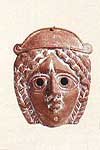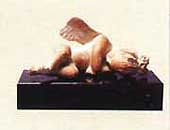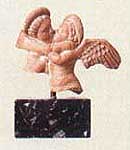The Theatre
 Drama
developed from the songs and dances performed in Athens at the festival of Dionysus, the
god of wine. The songs in the god's honour were sung by a group of 12 to 15 men, called
the chorus. Then an actor was included, who talked with the leader of the chorus. As more
actors took part, the words and action became more impotrant and proper plays were
written. Plays were performed in theatres in the open air. Seats for the audience were cut
into the slope of a hillside. They were made of wood at first, but were later replaced by
stone. The philosopher Plato tells us that in some theatres there was room up to 30,000
people. Performances lasted all day, with several plays in a row.
Drama
developed from the songs and dances performed in Athens at the festival of Dionysus, the
god of wine. The songs in the god's honour were sung by a group of 12 to 15 men, called
the chorus. Then an actor was included, who talked with the leader of the chorus. As more
actors took part, the words and action became more impotrant and proper plays were
written. Plays were performed in theatres in the open air. Seats for the audience were cut
into the slope of a hillside. They were made of wood at first, but were later replaced by
stone. The philosopher Plato tells us that in some theatres there was room up to 30,000
people. Performances lasted all day, with several plays in a row.
Plays were divided into tragedies and comedies. The judges awarded ivy wreaths to the
authors of the best tragedy and comedy.
 |
Tragedies told sad tales about the conflicts of love, honour and
religious duty. They were usually based on stories the audience knew well, such as the
Trojan War. Famous tragicians were Aeschylus, Sophocles and Euripides. |
 |
Comedies made fun of all kinds of things, including politics, religion
and important local personalities. In the comedies the chorus sometimes represented
animals. The actors wore padded clothes to make them look funnier. There were no female
actors, so men had to dress as women to play the women's parts. The most famous comedy
writers were Aristophanes and Menander. |
  |
 Drama
developed from the songs and dances performed in Athens at the festival of Dionysus, the
god of wine. The songs in the god's honour were sung by a group of 12 to 15 men, called
the chorus. Then an actor was included, who talked with the leader of the chorus. As more
actors took part, the words and action became more impotrant and proper plays were
written. Plays were performed in theatres in the open air. Seats for the audience were cut
into the slope of a hillside. They were made of wood at first, but were later replaced by
stone. The philosopher Plato tells us that in some theatres there was room up to 30,000
people. Performances lasted all day, with several plays in a row.
Drama
developed from the songs and dances performed in Athens at the festival of Dionysus, the
god of wine. The songs in the god's honour were sung by a group of 12 to 15 men, called
the chorus. Then an actor was included, who talked with the leader of the chorus. As more
actors took part, the words and action became more impotrant and proper plays were
written. Plays were performed in theatres in the open air. Seats for the audience were cut
into the slope of a hillside. They were made of wood at first, but were later replaced by
stone. The philosopher Plato tells us that in some theatres there was room up to 30,000
people. Performances lasted all day, with several plays in a row. 


